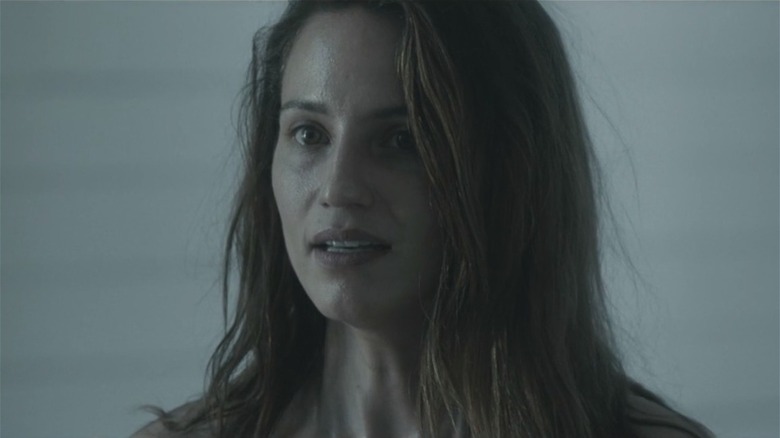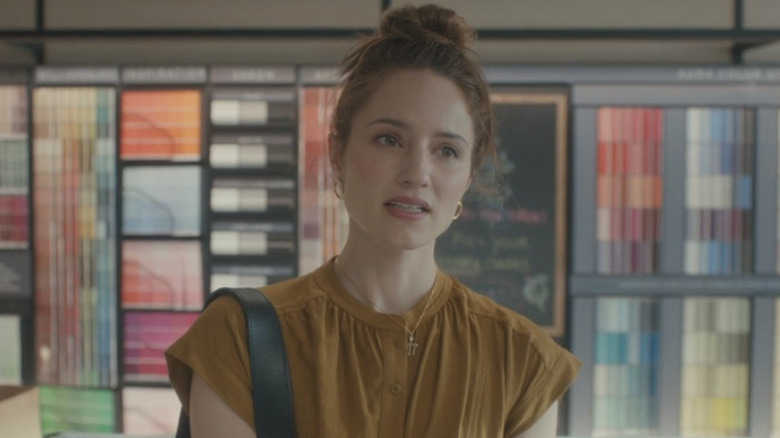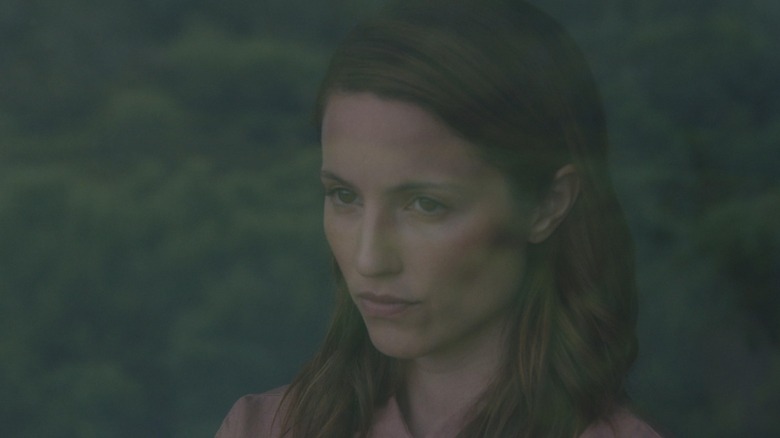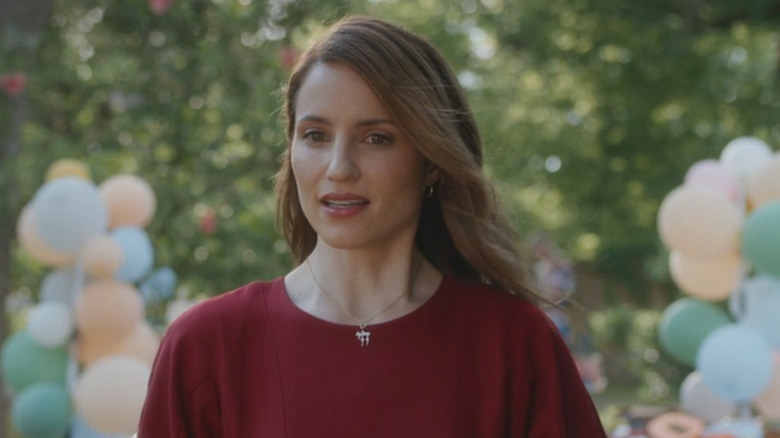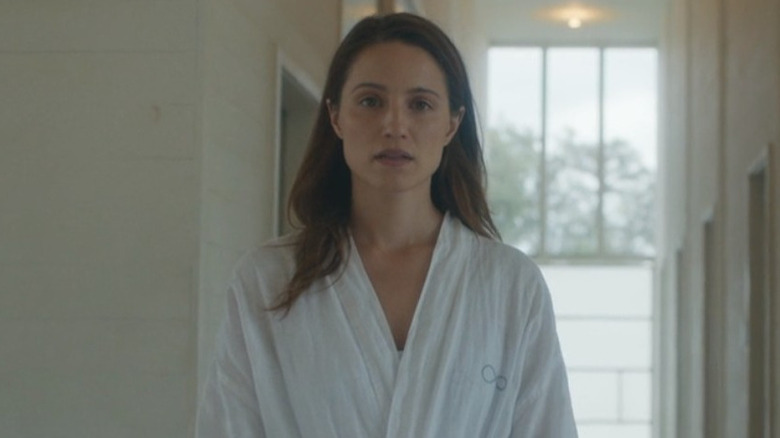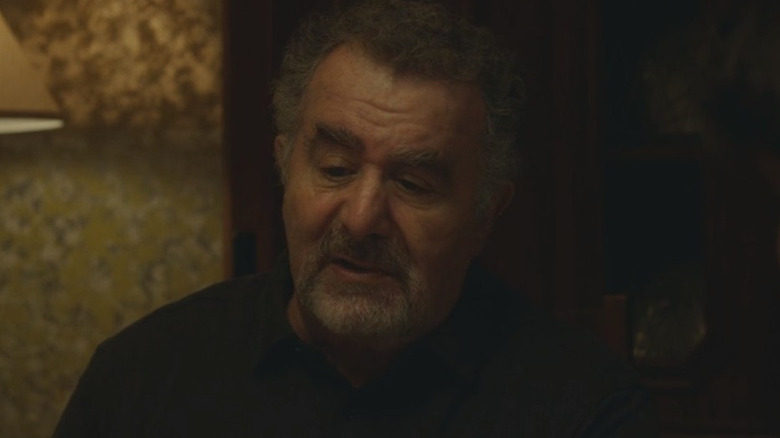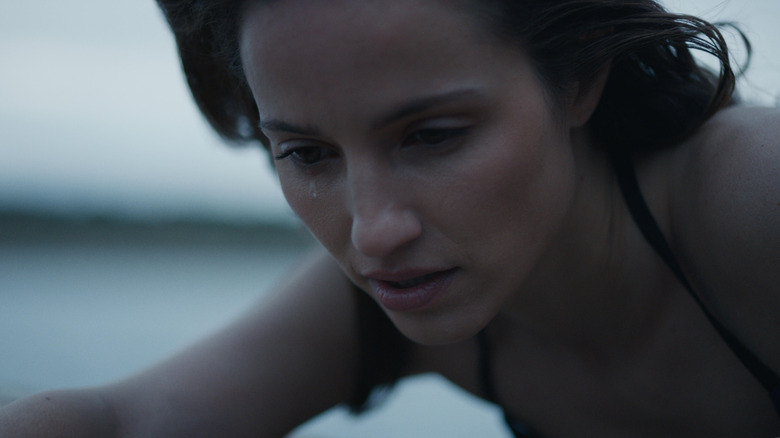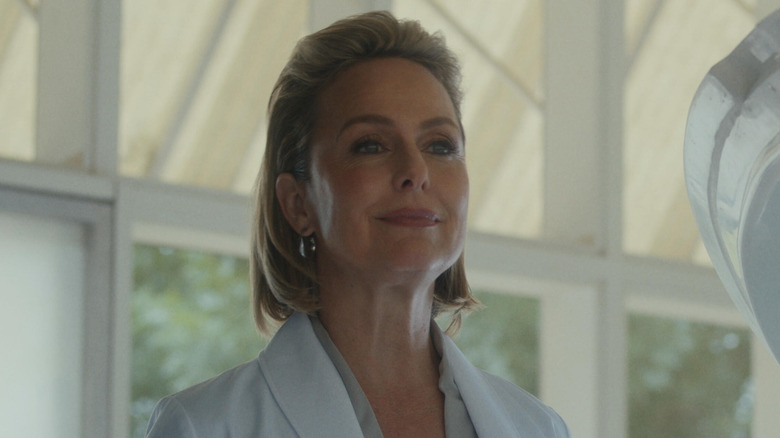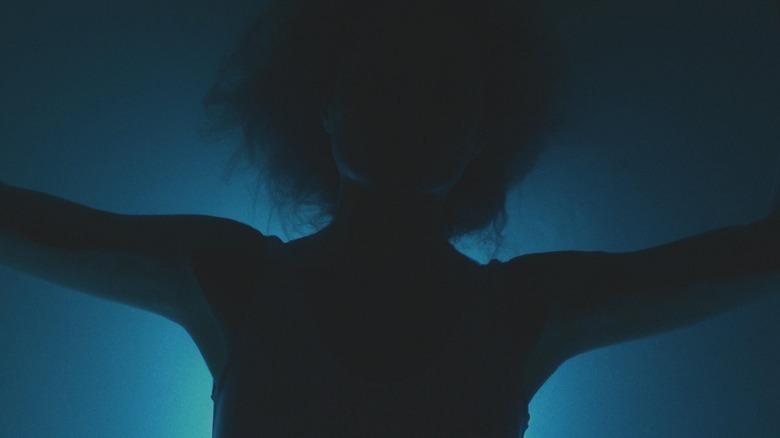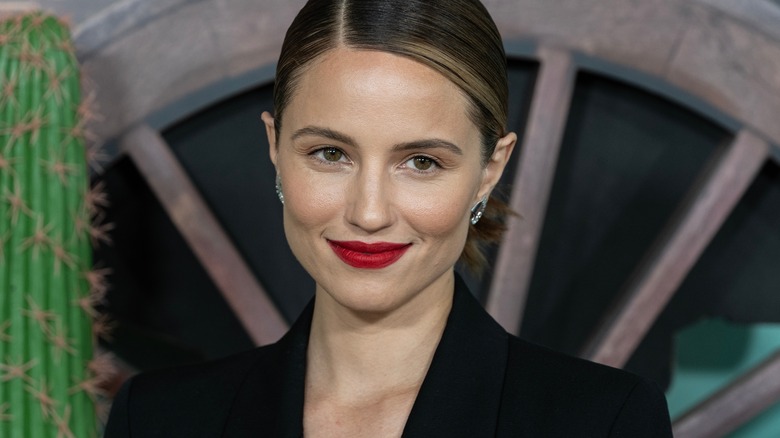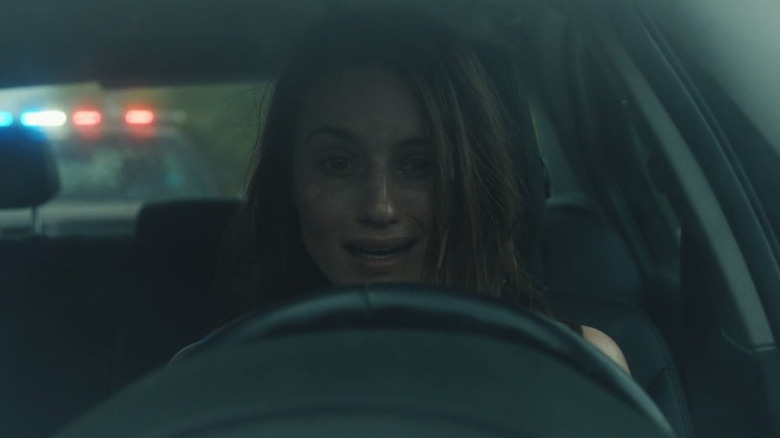The Ending Of Clock Explained
The Hulu original movie "Clock" is a sci-fi horror film more rooted in today's politics than audiences may care to admit. Released in April 2023, the movie focuses on a married woman that receives pressure from everyone she knows to take the next step of married life: having children. Ella (Dianna Agron) has never felt the biological urge to have children but is coming to feel like she may be in a small minority. She decides to try and solve the perceived problem by participating in a clinical trial for an experimental treatment regimen.
By the film's end, Ella and the audience find that nothing about the clinical trial was quite what it seemed, not even how the desperate wife discovered its existence. While it may have helped her "reset" her biological clock, it came at a great cost to her personal life and well-being.
Take a deep breath and prepare to enter a sterile facility as we walk you through the ending of "Clocked," everything you need to know about it, and what the cast and viewers are saying about it.
What you need to remember about the plot of Clock
"Clock" begins with a cold open at a baby shower. While Ella celebrates her friend's pregnancy, other women at the party begin to ask her about her lack of children. They, and her father, are pushy about it, claiming it's something she has to do as a woman. After a routine visit to a new gynecologist to check for breast cancer due to her familial history, she learns about an experimental treatment that helps women "reset" their biological clock.
After some trickery and pulling out of a work project, Ella spends 10 days at a clinic far away from society, undergoing various evaluations and treatments. Dr. Elizabeth Simmons (Melora Hardin), the doctor in charge of the trial, diagnoses Ella with tokophobia, or the fear of pregnancy. After a Rorschach test, Ella begins to have visions of a grandfather clock, spiders, and a tall woman in black. It's eventually realized that these relate to her life, such as her family's prized grandfather clock and her grandmother as the woman in black.
Dr. Simmons treats Ella with a prescription for several pills, a hormone implant, and a sensory deprivation tank experience. After leaving the clinic, Ella continues to have hallucinations, so much so that they start to impact her view of reality and her actions toward her friends and family.
What happened at the end of Clock
Just two weeks after leaving the facility, Ella feels the emotional need to have a child. Excited, she and her husband Aidan (Jay Ali) immediately begin trying, only for their efforts to be thwarted when the hormone implant cuts Aiden's genitalia. In the aftermath, it's revealed that Aiden directed Ella toward the gynecologist because he knew about the treatment and that the doctor would suggest it. But he also knew that his wife wouldn't consider it if the information came from him.
Horrified, Ella leaves, racing in her car toward the clinic to have the implant removed. Dr. Simmons refuses, which leads to a public altercation in the facility cafeteria. Ella decides to remove the implant herself, using a pair of pliers from her purse to do so in front of everyone. The world around her instantly changes, with colors appearing brighter. However, during the altercation and removal, the police arrive and are set to arrest Ella. For what is unclear, though she makes it out to her car and escapes.
The police continue to hunt her down while she talks to Aiden on the phone. He reveals that rather than destroying the grandfather clock when she previously visited her father, she killed him. This is why the police want to arrest her. She stops at a cliff, and though she initially lets them take her into custody, she breaks free and jumps off the cliff. A final shot shows her seemingly alive, lying on a boulder near the water line.
Ella experiences extreme societal pressure
"Clock" is an example of the societal pressure those able to bear children experience today. Audiences watch as Ella becomes the talk of the baby shower for not wanting her own child, with the mothers present commenting, "Yes, you do. You want kids." Ella also experiences this pressure from her father, who she and her husband see regularly for dinner. The topic always comes up, with him pushing the couple to have a child of their own before it's too late.
The pressure surrounding Ella is representative of what many experience today. People choose to live a child-free life for a variety of reasons, but the notion is still scoffed at in society. Some may feel that pressure from their family, specifically parents excited about grandchildren, or from the people in their friend group. As Ella is finding, the pressure seems to increase when her friends start having children, as they want Ella to move into the next phase of life they're in as mothers.
She's also questioned about what she does all day without children. As a designer, scenes show she is busy doing her job, visiting construction sites and meeting with clients. It's suggesting because she doesn't have a child, her life can't be fulfilled, or she shouldn't have anything going on that requires her time and attention. It's an outdated notion that many are still trying to overcome today.
Ella tries to overcome that pressure
In experiencing that pressure, Ella does what anyone might do: she tries to relieve it. She takes matters into her hands by trying experimental treatments as part of a clinical trial to try and force her biological clock to reset and light up the "right" way. She knows that, based on her age, she doesn't have much time left to safely have a child or even the ability to have one altogether. But her position on having children hasn't changed, so she has to go to extreme measures.
Of course, in trying to relieve the pressure and "fix" herself, she only puts herself through immense physical and psychological turmoil that ultimately places her in a worse position. She is forced to have a device implanted into her body that (according to Dr. Simmons) is designed to never be removed. She undergoes intense hallucinations that mess with her perception of the world around her. These things cause her to hurt those she loves.
Ella's experience is an important example of what many feel they have to do to meet the standards their family or society thrusts on them. While most cases are not as extreme as hers, some actively choose to forego their personal preferences or needs to better match the expectations of those around them. That may mean making certain health-related decisions that benefit others more than themselves.
Ella experiences generational guilt
Part of the pressure on Ella is rooted in generational guilt. Her grandmother, the tall woman in black she keeps hallucinating, was a Holocaust survivor. Her father regularly uses this information to try and force Ella to have children, saying that her grandparents didn't go through what they did only for the family tree to come to an end.
Using a tragic shared historical event to convince Ella to have children is the epitome of generational guilt. As a Jewish family, her ancestors went through one of the most horrific events in history. Rather than try and come together, her father uses that to drive a wedge between them. He knows he's dividing them that way because he points out how often he brings the topic up when she makes a face.
While Ella's final response to the pressure she receives from her father is not how anyone should handle the situation, it is a symbolic representation of how many feel when guilt is used against them in a similar way. It's hard to escape from it and can be even harder to call out, especially when you know the individual likely doesn't mean to cause you any distress; they're just doing what they think is best for you.
Ella sees a sign of rebirth
After throwing herself off the cliff, Ella lands on a boulder. As she looks into the water, a strange fish-like creature comes crawling out, sharing the boulder with her. Earlier in the film, while trying to argue why Ella needs to have children, her father discusses how the familial line came from similar creatures crawling out of the ocean and onto land, and in not having children, she would end the line started by that fish.
Ella seeing the fish crawling out of the water is representative of the rebirth she's about to go through. She's now realized that nothing will make her organically want a child, and her relationship may be on the rocks because of her husband's hand in her participation in the treatment. Her future is unclear, especially with the police waiting on the cliff above, but she at least has a small token telling her something new is coming her way.
Her possibly surviving the fall and seeing the fish is the sign she needs to build a new life — one that represents how she wants to live — without the pressure of others. She's starting a new family line, even if she doesn't have children. However, there are other theories as to what happened to Ella and what the ending means.
Ella's actions represent bodily autonomy
Ultimately, "Clock" is a film that speaks to a woman's choice and bodily autonomy. Ella made the choice, long before we are introduced to her, that she does not want children. Rather than accept that, people try to tell her she's missing out, guilt her into growing the family tree, try to diagnose her with something to explain why she doesn't want something society thinks she should, or plot ways to have her start experimental treatments. No one in her life accepts her choices about her body, even when they say they do to her face. In the end, Dr. Simmons refuses to remove the implant and is horrified when Ella removes it herself, further eliminating Ella's choice.
Her actions define her as an example of what many may call the feminine rage surrounding pregnancy and childbirth. She tries to "change" for those around her, only to discover nothing is what it seems, and the perceived changes were never real. She's angry, hurt, and, most of all, losing control over her mental and physical state at the hands of others with little recourse at her disposal. She goes on quite the journey to reclaim that control, even if it doesn't necessarily work out in her favor.
Maybe Ella didn't survive the fall
While the end of "Clock" shows Ella potentially surviving her jump off the cliff, others have presented a different way to interpret the scene. Based on the lack of injuries on her body (we don't see any cuts or bruises that surely would happen after falling from such a height), some argue that Ella seeing the fish is actually a hallucination she has in death.
In this case, the fish would represent her rebirth into the afterlife, where no one can pressure her into having a child. Rather than starting a new life without her husband or the pressures of those around her, she is crossing over into a new plane of existence, and the fish coming out could be representing both the ending of Ella's human life and the start of a new family tree for someone else.
There is also the interpretation that her meeting the fish is a full-circle moment for the family line, with the end of the line meeting the start of it. As her father said, a fish walking on land was how their family started, so it's only appropriate that they are reunited as the line dies.
Ella is only the next in line
While "Clock" stimulates several different conversations related to women, their bodies, and their choices, many are talking about the opening sequence, which doesn't include the main character at all. As the movie starts, audiences watch a woman in a nightgown standing on a swing, blood dripping between her legs. The scene continues with her crying as she uses the swing's chains to take her own life. Before the scene changes, a strange device covered in blood falls out of the now-dead woman's hand.
Some point to the scene as a way to foreshadow what Ella experiences and that the woman is another victim of the experimental treatment and the dangerous side effects that come with it trying to end her suffering. Others believe the sequence could be representing a self-inflicted miscarriage or abortion after succumbing to the pressure to conceive, though that wouldn't explain what falls from her hand. And there are some that, with everything that happened in "Clock," did not recall the scene happening at all.
If you or someone you know needs support now, call or text 988 or chat 988lifeline.org.
What the cast of the Clock has to say about the ending
While the cast and crew have been careful not to give spoilers in interviews, Dianna Agron has spoken about where she feels her character ends up as "Clock" comes to a close. In an interview with MovieWeb, the actress says audiences should've known from the teaser trailer for the movie "that it's not probably going to end very well" for Ella.
Argon continues, citing that she believes that "the place Ella ends up is very representative of the chaos that exists because of the lack of support she feels and the dominoes effect because of it," meaning audiences shouldn't be surprised by Ella's actions and how the movie ends. Argon's thoughts don't directly correlate to her thoughts on the theories about the cliff jump.
The actress also stated she "believe[s] the film shows how you don't really understand what your actions and words can mean to somebody." The implication here is that audiences should use the movie as a reminder that your words and actions matter, and even if you think you are doing them with the best of intentions, that isn't always how the person on the receiving end will take it.
What the end of Clock means for the possibility of a sequel
The ending of "Clock" wraps everything up well and does not hint at a sequel. While it points to Ella potentially creating a new life for herself (whether on Earth or somewhere else), there's no indication that audiences will see what that will look like. If theorists are correct and Ella did succumb to her cliff jump, there isn't a further direction for a sequel to take. Sure, it could follow another individual that visits the clinic and show their experience with Dr. Simmons, but that won't add anything new to the story unless there have been significant changes in the trial or how it's viewed in the industry.
Ultimately, the movie shares the cycle a woman goes through and the possible ending that she can experience in that cycle. From pressure to change, acceptance to rage, Ella experiences a circle of emotions that can be told in a single movie. We don't need to see where Ella goes from here because her story has already been told to the fullest. And not every movie needs to have a sequel or become a franchise.
